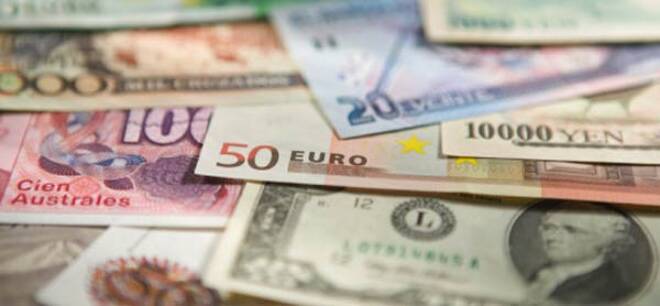Advertisement
Advertisement
The EUR/USD Drops to Support Following Weak Eurozone PMI Report
By:
The EUR/USD tumbled through support levels following a weaker than expected Eurozone compositive PMI which hit a fresh 1.5-year low. UK headline CPI was
The EUR/USD tumbled through support levels following a weaker than expected Eurozone compositive PMI which hit a fresh 1.5-year low. UK headline CPI was also softer than expected, while the Italian President asked Conte to try to form a government. The ECB’s Coeure sees no reason to extent QE but that did little to buoy the currency pair.
Technicals
The EUR/USD tumbled on Wednesday dropping down to the December lows at 1.1725. The next level of target support is seen near the November lows at 1.1562. Momentum remains negative as the MACD (moving average convergence divergence) histogram prints in the red with a downward sloping trajectory which points to a lower exchange rate. The fast stochastic is printing a reading of 17, below the oversold trigger level of 20 which could foreshadow a correction.
ECB’s Coeure sees no reason to extend QE
ECB’s Coeure sees no reason to extend QE, although he added that QE probably won’t end abruptly after September. The Executive board member told Germany’s Die Zeit that “we expect that economic growth will continue, and we are increasingly confidence that inflation is approaching out target”, against that background he suggested his view from the end of last year that he didn’t expect the bond purchase program to be renewed still hold. Coeure also said that it is “too early” to comment directly on the plans of the prospective new Italian government but stressed that EU treaties don’t allow the cancelling of debt of a euro-area country, or central bank financing for governments.
Eurozone Composite PMI at 18-months low in May
Eurozone Composite PMI at 18-months low in May. The hope for stabilization failed to materialize and the services PMI dipped to 53.9 from 54.7, the manufacturing output reading declined to 54.5 from 56.2 and the overall manufacturing PMI to 55.5 from 56.2. Markit reported that the flash readings showed a slowing of both business activity and new orders growth, “with hiring and backlogs of work likewise exhibiting slower rates of increase”. At the same time, companies “have become less optimistic about the outlook”. So signs that the recent slowdown was not just due to temporary factors, but the harbinger of a more protracted deceleration in growth. Price trends were mixed, according to the survey as “cost pressures increased but selling price inflation slowed”. The latter seems a further indication for a slowdown in demand. Food for thought for the ECB then, with the window of opportunity for a withdrawal of stimulus closing before central bank even started.
French ILO unemployment unexpectedly rose
French ILO unemployment unexpectedly rose to 9.2% in Q1 from 9.0% in the previous quarter. Mainland unemployment jumped to 8.9% from 8.6% and the total rose by 83K, versus a drop of -207K in Q4 last year. Expectations had been for a further improvement and while this may be part of the slowdown in overall growth in Q1 that was impacted by special factors, it is nevertheless add to concerns that a wider downshift in economic activity is underway as the ECB heads for policy normalization.
UK April headline CPI unexpectedly Declined
UK April headline CPI unexpectedly ebbed to 2.4% from 2.5% year over year in March. Core CPI rate also came in a tad under at 2.1% year over year, down from 2.3% year over year in the month prior and below the median forecast for 2.2% year over year. PPI data were mixed, with input prices falling to a rate of 2.3% year over year, below the median forecast for 2.8%, while output prices were 2.7% year over year, above the median expectation for a 2.3% year over year rate. The miss in the CPI headlines caused sterling to dip, though follow-through has so far proved to have been limited. The early timing of the Easter holiday relative to last year has caused some distortion, particularly in driving an outsized drip in air fares on the year-on-year comparison. Rising oil prices, if sustained, can also be expected to exert greater influence on headline inflation rates.
About the Author
David Beckerauthor
David Becker focuses his attention on various consulting and portfolio management activities at Fortuity LLC, where he currently provides oversight for a multimillion-dollar portfolio consisting of commodities, debt, equities, real estate, and more.
Advertisement
